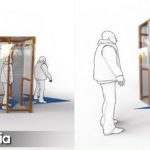A new study came out suggesting that the new coronavirus can actually stay in the air for a few hours.
Now, the World Health Organization (WHO) is advising people to consider “airborne precautions”, especially health workers.

Dr. Maria Van Kerkhove, head of WHO’s emerging diseases and zoonosis unit, is urging health workers to be more careful when performing interventions on those possibly infected by COVID-19.
The average person shouldn’t worry as much, but health workers have a lot to lose.
These medical professionals should observe caution when they are near an infected patient and most especially when they are intubating, where a tube is inserted inside the throat to make breathing easier.
Some activities in facilities unintentionally make certain particles exist for a little while before disintegrating.
“When you do an aerosol-generating procedure like in a medical care facility, you have the possibility to what we call aerosolize these particles, which means they can stay in the air a little bit longer.”
Health workers should be extra careful when doing their job.
“In healthcare facilities, it’s very important that health care workers take additional precautions when they’re working on patients and doing those procedures.”
Normal people should also put this into consideration.
“But for the everyday person, it’s the talking and the sneezing and the coughing which is why we want respiratory etiquette.”


